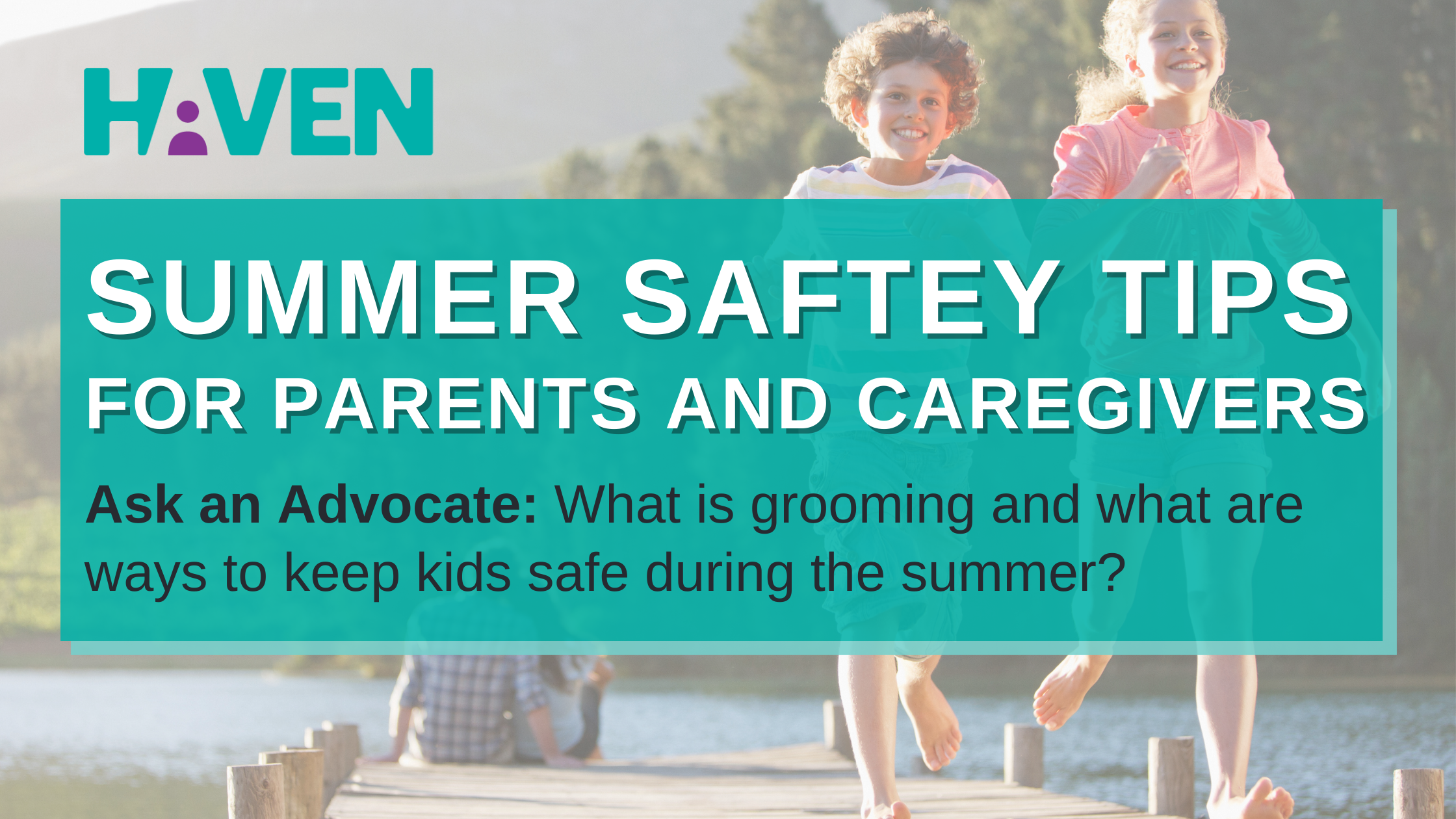
Ask An Advocate: Summer Time Safety Tips for Parents
- HAVEN Staff
- June 11, 2021
- Supporting Survivors / Changing Lives
- 0 Comments
Summer vacation is upon us and school is about to let out. Parents are gearing up to send their kids to summer programs, day camps, sleep away camps, or just sending their kids outside to play with friends and neighbors. With this change in schedule and social structure, parents often ask us how to help keep their kids safe in new situations.
The topic of “grooming” is prevalent in the media and parents wonder how they can recognize grooming behaviors.
This can be a scary topic, and we know that some parents and caregivers avoid this subject because they are not sure how or when to talk with their children about it. Unfortunately we know that child sexual abuse does happen, even here in New Hampshire. 1 in 4 girls and 1 in 6 boys will experience sexual violence. HAVEN’s goal is to empower families to be able to talk about personal body safety with their children and to help give kids the tools to know when and how to seek help. We at HAVEN do not want to alarm parents or create fear, but knowledge is power. Our advocate Ari is here to answer a few questions and give tips on how to help keep this summer fun and safe.
What is Grooming?
“Grooming can happen to anyone at any age and can even happen to entire families or communities.”
– Ari The Advocate
Grooming is a word used to describe the process by which perpetrators befriend children, take advantage of them, manipulate them, and coerce them into abuse. Grooming can happen to anyone at any age and can even happen to entire families or communities. The perpetrator can build trust through friendship, a position of authority, or good deeds. Grooming can happen in person or online. The perpetrator’s grooming behaviors can sometimes escalate to child sexual abuse.
Both perpetrators and those targeted for abuse can be of any background or gender. Perpetrators are most often someone known to the child and their families, not strangers.
Grooming behaviors can typically start with slowly pushing or crossing a child’s boundaries and seeing how they react. Part of the grooming process can include the perpetrator manipulating a child into believing they can’t talk about what has happened. Here are some tactics a perpetrator might use to keep a child from telling.
- Guilt: Remember, the perpetrator is often someone the child knows well, so the child may fear getting the abuser into trouble, and the abuser will reinforce that.
- Shame: Children may be told that what happened was their fault.
- Confusion: The child may not recognize what is happening as abuse, so they may have mixed emotions about what is happening, or have been told by their abuser that this behavior is normal.
- Fear: The abuser may tell the child that they will be punished if they tell. This can be especially true if the child was “doing something they shouldn’t” at the time of the abuse. The perpetrator may also tell the child that no one will believe them or help them if they do tell.
How do I talk about this with my child??
The best way to help your child establish healthy boundaries and feel safe seeking help is to have frequent, age-appropriate, open and honest conversations with them starting at a young age. Empowerment and education are the best tools for parents to use.
— Ari the Advocate
HAVEN Educators have developed a Child Safety Awareness class that highlights helpful information for parents. Some guidelines are:
- Talk about touches and have set rules at home about touching. Make sure the rules apply in every situation and not just with “strangers”. We suggest starting with our Personal Body Safety Rules:
- My body belongs to me!
- Touches in the private areas are only to keep me CLEAN and HEALTHY.
- Touches in the private areas are NEVER A SECRET.
- If I am hurt, confused, or scared I can TALK TO A GROWN-UP I TRUST.
- It’s never too late to tell.
- Keep on telling until you get the help you need.
- Reinforce the concept that my body belongs to me by making sure that when the child says “STOP”, everyone stops – including grown-ups..
- Use proper biological terms for private areas such as penis and vagina. Using pet names creates body shame and makes it difficult for children to talk about abuse. It can make it harder for them to tell because they aren’t understood when they try to reach out or because they don’t feel like they can talk to someone about this.
- Read books to your children about body safety. Some titles to consider are:
i. Super Duper Safety School; Safety Rules for Kids and Grown-ups
ii. My Body, What I say Goes by Jayneen Sanders
iii. Miles is the Boss of His Body by Samantha Kurtzman-Counter
- Be open and approachable. Ask open-ended questions. Check-in and check-in and check-in so that these conversations happen regularly.
- Have your child make a list of grown-ups they trust and would feel comfortable talking to and review it often. Be sure they come up with the list themselves! Blend safety concepts into everyday life!
- Acknowledge when your child demonstrates good touches.
- Emphasize that hurtful touches are NOT okay.
- Take advantage of teachable moments– such as helping a small child in the bath or getting a physical at the doctor to reinforce that touches in the private areas are only to keep a child clean and healthy.
- Help your child understand the difference between safe and unsafe secrets by stressing the fun part of safe secrets in real life (otherwise known as surprises) – for example “what we got for our friend for their birthday!” This will help differentiate those from unsafe secrets which are secrets that make someone feel hurt or afraid or a child is told they can never tell.
What other steps can I take to help keep my children safe?
“There are things parents can do to increase safety for their children. There are important things to consider; know your child’s environment, be aware of the people they interact with, pay attention to any behavioral changes in your child or those around them.”
Ari the Advocate
- Know the environment they are in:
- Check references for babysitters, daycare centers, and others
- Get to know your children’s friends and family/parents
- Ask questions and be visible
- Pay attention to patterns of people around your child:
- Is someone more interested in relationships with children than adults?
- Has anyone singled out your child and spending a lot of time with him/her?
- Pay attention to any behavioral changes. Is the child reluctant or refusing to see a certain individual? Are you seeing inappropriate sexualized behavior? Is there a change in eating and sleeping patterns?
What should I do if my child or another child shares that they are being or have been abused?
Responding to a disclosure of child abuse and navigating next steps is covered in depth in a video blog post here: https://havennh.org/how-to-respond-when-kids-disclose/
Remember: You are not alone.
You can call our hotline, 603-994-SAFE(7233), 24 hours a day, 7 days a week to speak to a FREE, CONFIDENTIAL advocate. We are available to chat via our website, HAVENNH.ORG, Monday-Friday 9 am-4 pm. Please don’t hesitate to reach out for help. We are here for you and your loved ones. You are not alone.
You Might Also Like

Adverse Childhood Experiences and Resiliency during COVID-19


